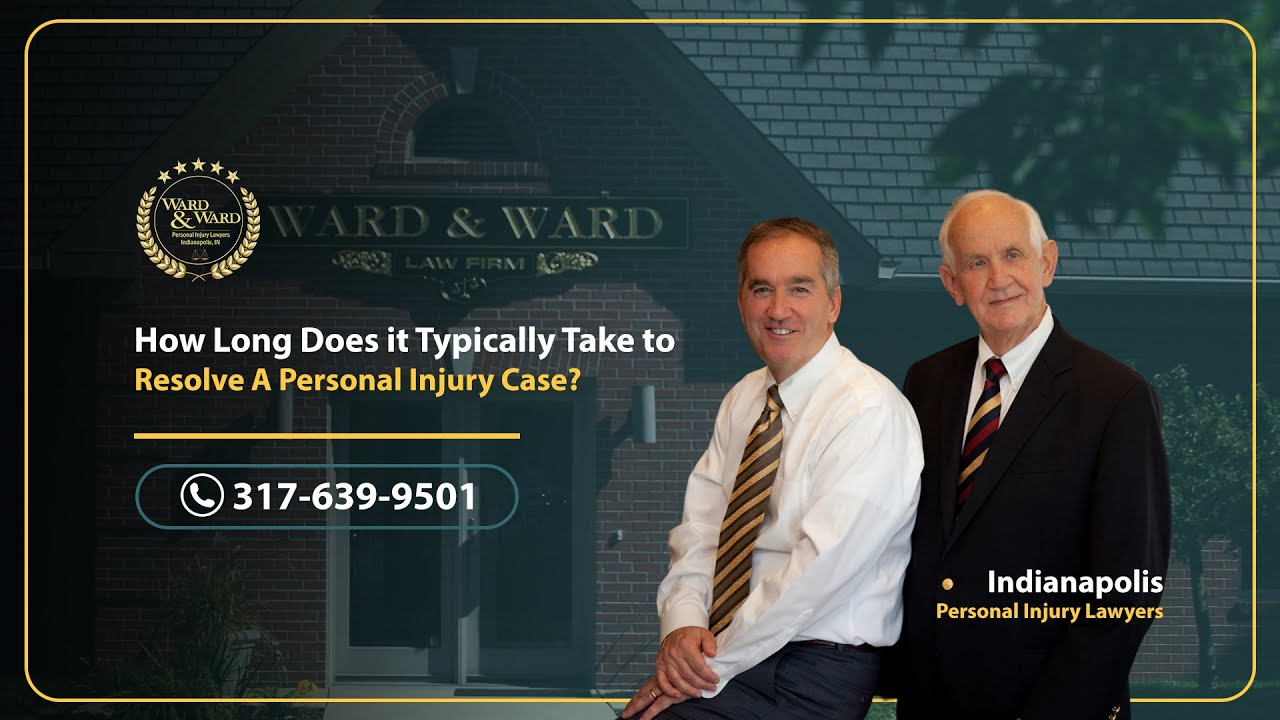
One of the first questions we hear from injured clients is: “How long will this take?” It’s a fair question. You’re dealing with medical bills, lost income, and uncertainty about your future. You want answers and compensation.
The honest answer is that every case is different. Some settle in a matter of months. Others take years to reach resolution. At Ward & Ward Personal Injury Lawyers, we’ve handled cases across this entire spectrum, and we’ve learned that several key factors determine how quickly your case moves forward.
The Typical Timeline For Personal Injury Cases
Most straightforward personal injury claims in Indiana settle within six to eighteen months. This assumes clear liability, reasonable insurance coverage, and injuries that heal predictably. More complicated cases involving severe injuries, disputed fault, or multiple parties can extend well beyond two years.
Cases that go to trial add significant time. From filing a lawsuit to getting a trial date can take 12 to 24 months or longer, depending on court schedules and case complexity. Then there’s the possibility of appeals, which can add another year or more.
We’ve settled minor injury cases in three months when liability was obvious and medical treatment concluded quickly. We’ve also worked on catastrophic injury cases that took four years because we needed to understand the full extent of our client’s permanent disabilities before negotiating a settlement.
Medical Treatment Must Come First
You cannot properly value your claim until you reach what doctors call “maximum medical improvement” or MMI. This is the point where your condition has stabilized, and your doctors can provide a clear prognosis about permanent limitations or ongoing treatment needs.
Settling before reaching MMI is almost always a mistake. You might discover six months after settling that you need surgery, ongoing physical therapy, or expensive medical equipment. Once you accept a settlement and sign a release, you cannot come back for more money when additional problems surface.
For serious injuries like spinal cord damage, traumatic brain injuries, or severe fractures requiring multiple surgeries, reaching MMI might take a year or longer. Rushing this process to get a faster payout usually means leaving money on the table.
Factors That Speed Up Your Case
Several elements can help move your personal injury claim toward resolution more quickly:
Clear Liability: When there’s no question about who caused the accident, insurance companies are more willing to negotiate reasonably. A rear-end collision with police reports and witness statements supporting your version moves faster than a complex multi-vehicle accident with disputed fault.
Adequate Insurance Coverage: Cases settle faster when the at-fault party has sufficient insurance to cover your damages. If policy limits are clearly inadequate for your injuries, we may need to identify additional sources of compensation.
Organized Documentation: Keeping detailed records of all medical treatment, expenses, and how injuries affect your daily life speeds up the claims process. We can present a compelling demand package sooner when you’ve maintained good documentation.
Reasonable Opposing Party: Some insurance companies negotiate in good faith. Others drag their feet and make lowball offers hoping you’ll give up. The insurance carrier involved significantly impacts your timeline.
Willingness to File Suit: Insurance adjusters know which law firms will actually take cases to trial. When they understand we’re prepared to litigate, they often make better settlement offers earlier in the process.
What Slows Cases Down
On the flip side, certain factors extend the timeline considerably:
- Severe or Permanent Injuries: The more serious your injuries, the longer treatment takes and the more time we need to evaluate long-term impacts.
- Disputed Liability: When fault is contested, we may need accident reconstruction specialists, additional witnesses, or extensive investigation before the insurance company accepts responsibility.
- Multiple Defendants: Cases involving several at-fault parties require coordinating with multiple insurance companies and legal teams.
- Insurance Company Tactics: Some insurers intentionally delay, make unreasonable offers, or request unnecessary documentation to frustrate claimants into accepting less.
- Complex Damages: Calculating future medical expenses, lost earning capacity, and long-term care needs requires input from various professionals and takes time.
Indiana’s Statute Of Limitations
Indiana law gives you two years from the date of injury to file a personal injury lawsuit in most cases. This is outlined in Indiana Code § 34-11-2-4. There are exceptions for certain situations, like cases involving minors or situations where the injury wasn’t immediately discoverable.
While two years sounds like plenty of time, waiting too long creates problems. Witnesses disappear, memories fade, and evidence becomes harder to gather. Starting your claim promptly gives us the best chance of building a strong case, even if the actual resolution takes time.
The Investigation And Demand Phase
Once you hire a Westfield personal injury lawyer, we begin investigating your claim. This involves:
- Obtaining police reports and accident scene documentation
- Collecting medical records and bills
- Identifying witnesses and gathering statements
- Reviewing insurance policies
- Consulting with medical professionals about your prognosis
- Calculating all economic and non-economic damages
This investigation phase typically takes two to four months, though it can be shorter for straightforward cases or longer for complicated ones.
After completing our investigation and confirming you’ve reached MMI, we prepare a detailed demand package. This document presents all evidence supporting your claim and demands specific compensation. The insurance company usually takes 30 to 90 days to respond and begin negotiations.
Negotiation And Potential Litigation
Negotiating a fair settlement can happen quickly or drag on for months. Some cases settle after a single round of offers and counteroffers. Others require extensive back-and-forth negotiation.
If negotiations stall or the insurance company refuses to make a reasonable offer, we file a lawsuit. This doesn’t mean giving up on settlement. Most cases still settle after filing suit, but the litigation process provides additional leverage and discovery tools to strengthen your position.
The discovery phase of litigation includes depositions, interrogatories, and document requests. This process typically takes six to twelve months. Many cases settle during or shortly after discovery when both sides have a clearer picture of the evidence.
Balancing Speed With Fair Compensation
We understand the financial pressure you’re under. Medical bills pile up. You might be out of work. The temptation to settle quickly and move on is real.
However, accepting an inadequate settlement to speed things up is rarely in your best interest. We’ve seen too many people accept quick settlements only to face years of additional medical expenses with no recourse. Our job is to get you maximum compensation, even if that means being patient through the process.
Sometimes the insurance company’s first offer is reasonable, and we can settle quickly. Other times, we need to fight hard through litigation to get you what you deserve. Our Westfield personal injury lawyer team evaluates each case individually to determine the best strategy.
What You Can Do To Help
You play an important role in how efficiently your case progresses. Attend all medical appointments, follow treatment recommendations, keep detailed records, and respond promptly when we request information or documents. Stay off social media or at least avoid posting anything about your accident, injuries, or activities that could be misinterpreted.
Good communication with our team also matters. Let us know about new developments, additional medical treatment, or concerns that arise. The more informed we are, the better we can represent you.
Every personal injury case follows its own timeline based on unique circumstances. While we work diligently to resolve your claim as quickly as possible, we never sacrifice the quality of your recovery to rush the process. If you’ve been injured and want to understand what timeline you might expect, reach out to our team to discuss your specific situation and how we can help you move forward.



